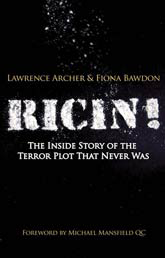 This book provides a definitive guide to the much hyped ‘terrorist threat’ known as the ‘ricin plot’, which was used by the British government and media to scaremonger the public into backing the brutal occupations of Iraq and Afghanistan.
This book provides a definitive guide to the much hyped ‘terrorist threat’ known as the ‘ricin plot’, which was used by the British government and media to scaremonger the public into backing the brutal occupations of Iraq and Afghanistan.
In January 2003 police raided a flat in Wood Green and arrested six men on suspicion of manufacturing the poison ricin for use in a terrorist attack. Other arrests followed in London and Manchester. A month later US Chief of Staff Colin Powell cited the ‘UK poison cell’ in his appeal to the UN to back the invasion of Iraq. In 2004 and 2005 the criminal trials of the ‘ricin plotters’ fell apart as it was clear there was no case against them.
Lawrence Archer was a jury foreman at one of the trials. The experience changed his life and led him to co-author this book, which explains how not only was there no ricin poison manufactured in the so-called ‘factory of death’, but how the prosecution were unable to provide any evidence that the defendants were an organised terrorist cell or had any connection to Al Qaeda.
To get hold of such information to tie the five together, the British police relied on details of Algerians in London, extracted from main suspect Mohammed Meguerba, while he was being tortured in 2002 in Algeria.
In fact the ‘ricin plotters’ were an unremarkable group of Algerian asylum seekers, who had met at the Finsbury Park mosque, a social centre for Algerians in London at the time, and were sharing a flat.
On 20 March 2003, the forensic crime laboratory at Porton Down, which was privately contracted by the British Police, reported that they found no evidence of any ricin poison at the so-called ‘factory of death’. However, by that time the damage was done. Relying on an earlier statement from Porton Down manager Andrew Gould the British government had issued a terrifying public statement and Colin Powell had already told the UN Security Council that ricin poison had been found in London and cited it as a reason to go to war with Iraq.
Only one defendant, Karmel Bourgass (arrested in Manchester) was sentenced in relation to ricin, on a charge of conspiracy to cause a public nuisance; the other defendants – Sidali Feddag, Samir Asli, Mouloud Bouhrama, Mustapha Taleb, Mouloud Sihali, Aissa Kalef – were found not guilty of all charges after a long and exhausting trial during which they were remanded in high security prison conditions. However, their terror and humiliation did not end there as the three Algerians who did not have legal status to remain in the UK were immediately faced with threats of deportation to Algeria and persecuted with restriction orders, heavy police monitoring and surveillance.
Sihali, Kalef and Feddag were released on immigration bail and forced to sign on at a police station up to twice a week. On 15 September 2005, dozens of armed police broke into Sihali and Taleb’s separate flats and arrested them as ‘a threat to national security’. They were not charged and no explanation was given. Police injured Sihali’s knee during the arrest, causing him permanent damage. Sihali and Taleb were then held in Belmarsh prison for four months. On release they were electronically tagged and kept under curfew for up to 20 hours a day; they were subjected to regular and random searches by immigration officers, not allowed to go further than a mile from their homes and denied mobile phones and internet access. Both were not allowed to work. In 2006 Taleb’s bail was revoked and he spent two years in Long Lartin prison, before being released in 2008, again on strict bail conditions.
Archer and Bawdon’s book shows how the lives of innocent men seeking asylum in Britain were wrecked by the state attempt to spread mass hysteria about a potential terrorist threat in Britain. However the defendants’ continued determination to resist shines through. This account of the ricin frame-up and trial is a testament to the principle that we should never remain silent in the face of injustice, prejudice and persecution.
Anthony Rupert
Ricin! The Inside Story of the Terror Plot That Never Was by Lawrence Archer & Fiona Bawdon (Pluto Press) 2010




